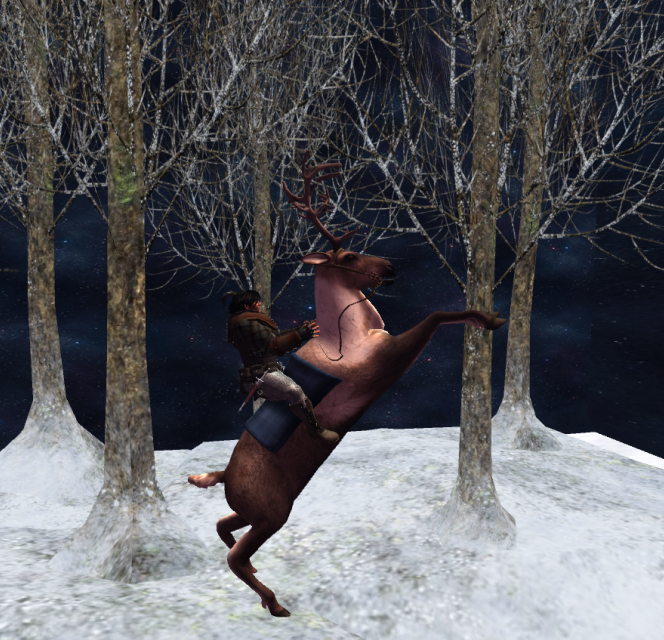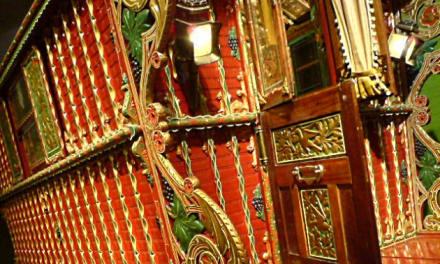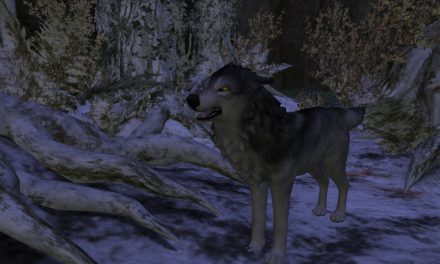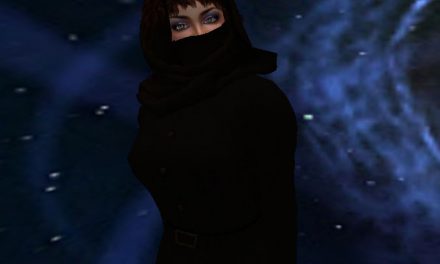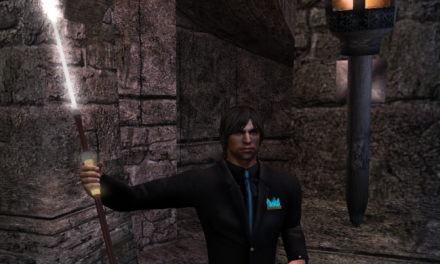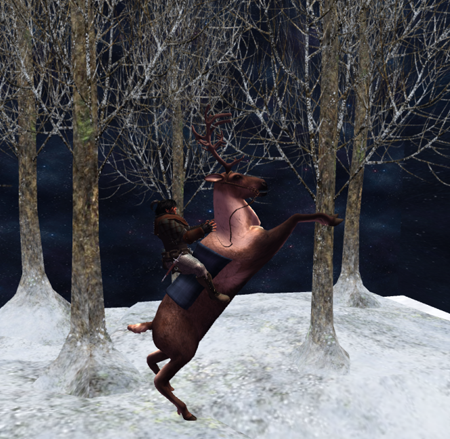 The Key of the Khazilim
The Key of the Khazilim
By
J.B. Toner
We are not elves. Small, bearded craftsmen who dwell in the Arctic mountains. How you people mistake us for the long-ears, I cannot say. It may be that the man Moore could find no better rhyme to precede “And I laughed when I saw him in spite of myself,” and so it began. But there was no need for slanders. We have rhymes. “Wharf.” No others, perhaps. But “wharf” is a good word. A strong word. Though not the right word, for the Red One is not fully of our blood. Of his kind, there is only one.
I am Groth. I came to your lands because a grave dishonor was done. Not by mortal men. I sorrow that your people suffered for dwarven transgression, but in all worlds justice is in scant supply. I sorrow that by my hand Dino’s Diner was offered to the flames of oblivion, and that nevermore shall the shake of milk nor the dog of chili be tasted there.
From the North I came riding, mounted on a reindeer, to the town of Boston. You wonder, perhaps, how I could ride so far unseen by your camera machines; and as I do not seek to offend, I will not mention that your people are ignorant fools. Our world, juxtaposed on yours, belongs to another plane. You cannot perceive us, nor we you, without passing the Deepling Gates. Unless, of course, one holds the Key.
To the fogbound Fourteenth Gate I swiftly came. There the Keeper waited. Nine feet tall he stood: twice my height and one foot more. His cloak was grey, his sword was flame. I have battled ogres in the frozen steppes, and fear no stature. But the Keeper was a Cherub, powerful enough to turn cities to salt. I once heard a drunken tale that humans picture Cherubim as chubby winged infants, but I know it to be false. Surely some wisdom still abides in the mortal world.
“Peace be to you,” said the Keeper.
I dismounted and bowed low. “And to your spirit. I am Groth, on direst errand from the very Claus. I must pass into the lands of Men.”
“Wait.”
“Wait, you say? My business will not do so.”
He spoke no further word.
“Friend Keeper, I seek no quarrel, but I must and shall pass through.”
A looming silence.
“Know that fifty-seven have been pulped upon this hammer.” I raised my father’s weapon. “I have no wish to make it fifty-eight.”
A voice rang out: “Stay your hand, dear fellow, lovely bearded scion of the snows!”
“Oh, no.”
“Peace be to you,” the Keeper said again.
“And to you and all your numerous family, honorable Keeper, and to you, Master Dwarf, and all the cavern-carving folk of your acquaintance!” A dark-haired slender form came bounding toward us. Its eyes sparkled like cheap fake gems; its ears rose like antennae above its idiot head. “Vissarion Tulurieth, I. Urgent business calls me to the smoky realm of man and all man’s sons. May I pass the Deepling Gate, good Keeper, friend of Elves?”
The burning sword lowered. “You shall pass together.”
“How pleasant, a new partnership!”
“. . . What?”
*
So drolly dour, these mountain folk! When I first met red-bearded Groth son of Grath, he was a dove’s feather away from matching his (no doubt weighty and worthy) hammer against an angel’s blazing glaive, and as marvelous a tale as it might have made, I thank the Mightiness that my scuffle with the Dark Frog of Malgothrond took not a moment longer than it did. But it seemed the far-seeing Keeper knew my quest—nay, both our quests—and had been in wait of my coming, for I no sooner came than he welcomed us both together.
I bowed to my new friend and ally, and said, “Vissarion Tulurieth, son of Quistilith Zelenorm, soldier of Favenheld Dale and bearer of a sacred trust. I greet you in the Name of the Mightiness, good Master Dwarf, and welcome our new comradeship with greatest joy!”
He glared at me, then up at the Keeper, then back at me. “Groth.”
“Come, friend Groth, for time grows short and our courtesies must yield to exigency. You too, I guess, are bound for Boston?”
“Aye.”
“Then let us be off at once!”
“Hold,” he growled, and his hammer slightly rose. “Your quest, elf—is it for the Key of the Khazilim? For I am bound to return it to the Pole, at peril to any who would hinder me.”
“No indeed, good friend, but I see now that our missions are as one, for I am bound to ensnare and incarcerate the lawless one who seeks possession of that very Key.”
His eyes narrowed. “You come for Gar son of Thrug? That is not well. He shall face dwarven justice, and none of yours.”
I laughed merrily, knowing his belligerence was merely a sign of gruff affection. “Nor would we tread upon your right to discipline your own! Nay, my dear fellow, I seek not the thief but the one to whom he’d sell his stolen goods. To speak in all verity, ’twas not till this moment that I knew the stealer’s name.”
Groth opened his mouth to retort, then closed it again to ruminate. “I had not known that he sought to sell it.”
“The buyer is of elven kind, long since exiled to the mortal world.”
“His name?”
“Well, well.” I smiled. “It seems we both must keep our little secrets. It would not do if I returned to my masters with news that my new swordfellow had let his sense of justice get the better of both him and my quarry’s skull, hey?”
He scowled but acquiesced, like the fair-minded fighter I could so clearly see him to be. “Enough talk, then.”
“As you say, friend Groth! How now, noble Keeper, may we not pass?”
Wordless, the towering Cherub stood aside, and the Gate
began
to
said Groth “hate this part” said Groth
strange things to one’s perception of time and spaception of time and spaception of time and space
time
space
into great silence
heart of light
sinking, stars like mud
box of aeons
(the universe is in here with me)
chasm
infinity, filled with emptiness
then wind
leaves and planets swirling
A world, a face
Red beard—stone underfoot—pulse in the palms of my hands.
I drew in a deep breath through my nose, like one awakening from long reverie.
“Friend Groth. . . welcome to Earth.”
*
Hear my jest. An elf, a dwarf, and a nephilim walk into a bar. The bartender says, “What is this? Some kinda joke?”
A few notes. Primarily: this is no joke but the mere quotidian, the daily bread if you will, at Dill’s, the old-world nook of a tavern of which I am the happy proprietor. Mystical folk of every stripe congregate under my roof. Secondarily: “Nephilim” is a plural noun; the singular form is “a Nephil,” the favored offspring of angels and men. And tertiarily: I rarely walk into this bar. I live here.
Now—all that being said, an elf and a dwarf did walk into my bar on the evening under discussion. In point of fact, two elves and two dwarves walked in—or so I thought at the time. The first was a lovely blonde with grey eyes, her ears hidden by one of the purple shawls that were fashionable amongst Canadian elves that century. I didn’t recognize her, which was unusual. I’ve been here a very long time, you see. She ordered an exceptional silver wine and went to sit in a shadowed corner.
Not long after that, two old customers entered together. One looked characteristically cantankerous—“Groth son of Grath!”—and the other characteristically jolly—“And Vissarion Tulurieth, son of Quistilith Zelenorm! Welcome back to Dill’s.”
(You wonder, perhaps, why Vissarion’s last name was different from his father’s? In elvish nomenclature, the second name is an epithet. “Tulurieth” means “Wingfoot”; and although I had not seen this fellow in action before, I could imagine how quick he must be to earn such a title from his own people. The slowest elf is still faster than a man.)
“Ho, Dill.”
“Many greetings, Dill old friend, purveyor of the choicest ales and tender of the warmest hearth this side of the Fourteenth Gate! What cheer on this autumn eventide?”
“Another day, another night, my friend. Things change, and nothing changes. How is your lovely mother?”
“Well indeed, I thank you, and will surely tell her you inquired! Business is brisk, I trust?”
“Quite so, quite so. Better than ever since the mortals invented this live-action role-playing. Mind you, I have to keep an eye out for underage human drinkers now.”
He frowned. “There are vampires about the place?”
“No, friend, I mean drinkers who are human, and who are under the legal age for—”
“Dill,” said Groth. “I seek my old compatriot, Gar son of Thrug, and heard tell that he was hither bound. Have you seen him, perchance?”
“Thrugson? Nay, not these nine winters past.”
“What of the Lady Elladonna Mirielavay?” asked Vissarion.
I frowned. “Don’t know the name. New to town, is she?”
“After a fashion.”
I never forget a name, or a face. At the moment there were perhaps two dozen stories scattered about the common room, both mystics and mortals, drinking earthly and otherworldly drinks. A small fire crackled in the corner and the lights were dim, but the chatter and the fiddles were lively. Every denizen of the higher realms who came to the eastern coast knew to seek out Dill’s for company and cheer. Even as we spoke, the door swung open once again, and in clomped a scowling greybeard dwarf.
Groth turned, and his face turned grimmer than before. “Gar.”
The newcomer froze, and then produced two tomahawks. “Groth.”
Quick footfalls from behind me, and the click of a well-oiled Glock nine millimeter. My bouncer, Violence Jones. “All right now, boys. Whatever this’s about, y’all take it outside.”
Gar turned his snarl toward Jones. “Be off to the ever-flames, pig-dog human!” And he raised an arm to hurl a weapon.
“Dwarf, no!” The cry came from the corner of the room where the elf maiden sat with her wine; but it was already too late. I don’t retain Jones for his restraint. Three gunshots—a golden blur—and the she-elf stood in front of Gar with her arms outstretched and three red holes in her belly.
“The hell’d she do that for?” said Jones. For him, that bordered on remorse. But before anyone else could speak, the lady gave a wry grimace and the smoking lumps of lead popped out of her slender midriff and clattered to the oaken floorboards.
“Oh, no,” I said aloud. “She’s one of the Lyrilim.”
*
Name’s Violence Jones. Yeah, that’s my real name. Mama’s a tough old bat. I’m full-blood human, just like you, but I been bouncing at Dill’s for quite awhile now and I’ve gotten used to some unusual things.
Now I’m a lean drink of water and Dill’s a big barrel-chested fella, but mark my words, I could put him on his butt except for one thing: nephilim regenerate like God don’t want ’em back. You could drop a house on one of those suckers, wait five seconds, and watch him mosey out the front door. So when these weirdos take to fighting, it’s like a big game of rock-paper-scissors: elfs are fast, dwarfs are strong, nephilim’re tough.
Never heard of no lyrilim before that night, but I can add two and two. Saw her move, saw her heal. And we already know angels misbehave with humans now and then, so why not with elfs.
The patrons were on their feet, some ready to rabbit, some ready to jump in the scrap. The dark-haired elf, Vassilyvich or whatever, jumped on a table and shouted, “Hold fast, good friends! I represent Favenheld Dale, and come with peace to halt a grave injustice!”
“What injustice?” called some obliging schmoe.
He jabbed a finger. “This lady, Elladonna, was rightly banished from the Mystic Realms. She stole from the Dragons, and by that stealing nearly brought about a war between our peoples.”
“Which I stopped,” the elf-chick said, examining her fingernails.
“By making the Dragons look like idiots. The balance of peace is now tenuous at best, and you know the terms of your exile. You shall return when the political maelstrom you’ve engendered is resolved. It may take many hundred summers, but such is the judgment of the Council.”
“Hold up a sec,” I said. “How exactly do you stop a dragon war?”
She glanced over at me. “By paying the Flame Tribute.”
“The what now?”
“For a cessation of hostilities, I let their chieftain bathe me in his fiercest fires.”
“Oh, I see. And then you healed up on the spot and danced away.”
“I most certainly did not dance in front of those reptiles. I was entirely naked, for one thing.”
“Sorry I missed that.”
“Such gallantry, sir.”
“Well heck, I done shot ya already, I figure we can skip the pleasantries. Violence Jones, by the way.”
“Son of Thrug,” Dill said suddenly. “Your ill-gotten Key will not work in my establishment. The doors are warded here.”
The dwarf with the tomahawks was jiggering around with our front door. Obviously I was keeping half an eye on the guy, but I reckoned he was just trying to slip out, which suited me fine. I guess he was up to something else.
“Craven filth,” said the red-beard. “You would slink away from honored combat?”
“I have no quarrel with these long-ears and wingless mongrels. You and I can settle our affairs another day.”
“Nay!” said Vissary-whatever. “This ends here and now, for justice and serenity.”
I gotta tell ya, folks. They’re an odd bunch, these mystics, that’s for sure. But I love the way these people talk.
*
I am Gar. I serve the Red One with fealty, and have done throughout these many Yules—nigh on two hundred now. But I grow old. I have no mate, no offspring; I seek only to live out my days in comfort ’neath the Easterly crags of the polar sea. And so, when I heard tell that some fairy lass was offering raw diamond for the Key, I bided my time and I filched it from the Claus.
’Tisn’t easy, see, to slip between the worlds. Over all the vasty globe, there are only nineteen Gates, all Cherub-held. If they decide you oughtn’t pass, then pass you surely won’t. But the one we serve forged an item, long and long ago, with dwarvish skill and angelic power. With that item, you can turn any door in any world into a portal to any other door. All that’s needed is to put in the Key (it fits any lock, you know) and think of a door near your destination, and you can walk through a doorway in Qaanaaq of Greenland and emerge from an ivory shed in the flower-meads of the High Elves if you like.
But apparently it doesn’t work at Dill’s.
“Keep your justice,” I told the long-ears. “And stuff your serenity. All I want is a bit of windfall; it’s no concern of yours.”
“You shall not sail by this wind, bearded one.”
“Enough! Mirielavay, we’ll meet some other time.” I turned and bolted for a squat glass-walled building across the street. Upon the door was “Dino’s Diner” writ. All I needed was to reach the knob and I was free.
But I underrated Groth Grathson. From the doorway of Dill’s he hurled a Dire Coal with the mighty arm of our race, and the whole diner erupted in flames. “Ha! No escape that way now, eh?”
“Groth,” Vissarion said mildly, “I could have caught him.”
“Aw, no!” Jones mourned. “That place had the best cheese fries.”
The tavern’s patrons were swirling into the street to see the inferno; the diner’s, to escape it. Flashing lights and banshee wails were converging on us—the gendarmerie, no doubt. Two of the folk from Dill’s abruptly split their shirts and began to sprout fur and fangs: startled werewolves in the moonlight. This was looking grim.
Then—I was distracted, or he would never—Groth tackled me to the hard black stone. “The Key!” he roared, digging at my coat. “Where is it?”
“Be off!” I howled. “Be off with you!” But he was strong, Groth, even for our kind. He pinned me and he searched me, and he found the Khazil-Key.
“Dill,” he panted. “Can you drop the wards upon your door for the nonce?”
“Of course,” said Dill, and made a gesture.
Groth slammed the door, plunged the Key into the lock, and opened it again.
And out stepped Santa Claus.
*
Hello, child. Do you remember me? It’s years now since you last hung a stocking, but I haven’t forgotten. Nor failed to keep you in my heart.
As you’ve heard, I am the ancient son of Angel and Dwarf—the only one of my kind, the Khazilim. Long and strange was my quest to find life’s purpose; long and strange, the days since I found it and was charged with the keeping of Christmas. I have forged many items of power in furtherance of that charge, the Key by no means least among them.
When I passed through the door of Dill (good fellow), I saw fear and sorrow in the streets. It was not well. Ere aught else, I drew forth a Snow Sphere and flung it into the blazing diner. An argent detonation, and the flames were quelled.
“Chief Braddock,” I called.
The firefighters’ leader, a kindly woman, stepped forward and removed her hat. “It’s you!”
“It is. I commend you for your duties, and I think your boy will soon recover from his flu.”
She opened her mouth and closed it again. Then she said, “Thank you, sir.”
“You’re very welcome. Groth, my friend! While you have the Key, please open that door upon the Fields of Cormorath.”
“Done, sir.”
“Charles, Danton—go and run to your hearts’ content.” The half-turned werewolves snarled their gratitude and went loping through the doorway to the endless moonlit grasslands beyond.
“Dino?”
A gruff, good-hearted man. He approached, and he was miserable. “They burned my place.”
“Be at peace. The dwarves will toil swiftly. In three days’ time, your diner will be better than new, and stocked with knives that will never dull.”
In his ruddy face, hope dawned. “Thank you, sir!”
“Nay, friend, I beg you to take our apologies. This fight was not yours, and we of dwarven kind regret that you should suffer for it.”
“Well—well, merry Christmas!”
I smiled. “A bit early, Dino. But likewise to you, when comes the season. Chief Braddock, I sense a smoke upon the air, and not from tended chimneys. I fear you’re needed.”
Their radios crackled, and they headed for their vehicles. Some looked like men awakening from dream; others, like men returning to it. Like all mortals who encounter the mystical, they would remember just as much as they chose.
Dill grinned at me. “A well-timed entrance, old friend. I fear even Jones here would have been hard put to contain such chaos.”
“Nephil, please. I had it under control.” Jones glanced at me. “But I mean, uh—thanks for your help and everything. Sir.”
“You’re very welcome, Violence. I believe your mother’s eyesight will be improving this year.”
“I—hey—thanks, Santa.”
I nodded. “Now for sterner matters. Gar. My friend.”
He came forth, and his beard was low.
“Gar, why have you done this thing?”
“Sir, my bones have grown weary with the labor that was once my delight. I craved—” his gaze lowered further still “—I coveted a place of ease in which to live out my days. Now they will end in shame.”
“Perhaps. And yet, the weresharks on our Eastern front grow bolder. I have not yet asked for volunteers, because the post is one of deepest solitude and cold; but I need a scout to dwell by the polar sea. He would be entrusted with a Seal of Warding, and admonished that if his watch upon the waves grew slothful, then he would indeed be shamed.”
His head rose slowly, and his eyes kindled. “My vigilance will never sleep. This I vow by the strong right arm of the Mightiness.”
“That is well. Now: Elladonna Fargazer, daughter of Nathanael.”
She smiled coolly. “Father Christmas.”
“I strive in all ways to be a giver of gifts. But you laid claim for selfish cause to that which is mine, made at great cost, for the protection of innocent life.”
“I myself am innocent, unjustly banished. And my claim to items made with angel’s power is no less than your own. My father too is of that kind.”
“Small remorse, child. I am hard-pressed to see why you should not be taken back to elven lands and locked away in dungeon deep.”
Then Groth, honorable son of Grath, heaved a sigh. “Sir, I must speak. You know I hold no great love for the long-ears.” Vissarion chuckled and slapped him on the back. Groth ignored him. “But this Elladonna—the mischief that befell here is not truly of her making. ’Twas my battle-mongering led to the man Jones firing his weapon, and to the conflagration of Dino’s Diner.”
“His mongering and mine,” said Gar. “And I—I cannot accept mercy for seeking to sell the Key if she receives none for seeking to buy it. Especially when she saved my imbecile life.”
At no cost to herself, I thought, noting the three red holes. Still, the deed was good. I saw no malice in her, only a wildness untempered by maturity. And I have known lyrilim to learn wisdom through the burdens of responsibility. “Vissarion Wingfoot?”
“Sir!”
“It is no place of mine to meddle in elvish affairs. However, I beg to claim kinship with this maiden by reason of our paternities, and to offer a suggestion to the Council, if they will hear it.”
“As their representative, sir, I hear it gladly.”
“The Goblins encroach on my Western borders. I need a spy who can tell me of their movements.”
She clapped her hands. “Oh, what fun! Vissarion, old friend, do let me spy on the Goblins!”
“Hush, hush. I can hear for the Council, but I cannot speak for them. All the same, I do not doubt they will accept. Better, surely, to make use of your talents than to vex our jailers forever with keeping you. But Ella, if you still call me your friend, then I pray you to show respect to Master Claus.”
“Of course. I beg your pardon, sir.”
“I gladly give it,” I said. “And now, I fear Master Dill would take great offense if we departed with dry throats.”
“Depend upon it,” said he. “Let the red wines flow!”
“Yeah, I wanna see if this Gar fella can throw a dart any better’n he throws a tomahawk.”
“By Hell’s donkeys, Master Jones, I once threw a dart up a wyvern’s fiery nostril.”
“And Groth and I must toast our fruitful partnership!”
“We’re not partners, you blithering ninny.”
“Ha! You dwarves and your thorny exteriors.”
Our weird and merry party went inside, and the red wines flowed indeed. The ales and whiskeys too. It did my old heart good to see new fellowships coming to be, and I knew it was not without the hand of the Mightiness that all this had transpired. For in all lands justice is in scant supply, and the Dark grows ever bolder.
But so do we.
J.B. Toner studied Literature at Thomas More College and holds a black belt in Ohana Kilohana Kenpo-Jujitsu. He currently works as a groundskeeper in New Hampshire, and he and his lovely wife just had their first daughter, Sonya Magdalena Rose. Toner blogs at jbtoner.blogspot.com and tweets at AntiheroCouplet@twitter.com.”
